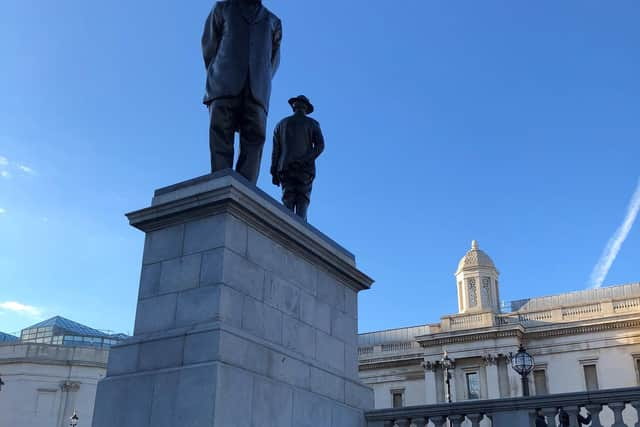Statues like "Antelope" help us challenge the predominant narrative of colonialism - David Hope-Jones
I was delighted to be with Samson, and his Scottish wife Susan, for the unveiling of his statue “Antelope” in its new home, the fourth plinth of Trafalgar Square. This immense, larger-than-life bronze statue represents the Baptist pastor and justice activist John Chilembwe (1871-1915), a key figure in the resistance to colonialism in Nyasaland (now Malawi). Beside him, on a smaller scale and facing the other direction, stands his friend the European missionary John Chorley.
The statue literally sizes up to the residents of the other three plinths and the countless other monuments which celebrate and project imperial power. It gives a powerful counter-narrative, raising awareness of just one of the countless rarely-told stories of resistance to colonial power: stories from Africa, India and across the globe of communities coming together to fight against racism and prejudice.
Advertisement
Hide AdAdvertisement
Hide AdWe cannot and should not eradicate our past. Rather, we must understand it and we must learn from it. Key to this is the ability to listen to others, to really understand the different perspectives and the different legacies that history has had, in different communities. Chilembwe was regarded as a murderous terrorist by the British colonial administration but is remembered in Malawi as a national hero and freedom fighter. Perspective and context are everything.


Shouting at each other, however cathartic, is unlikely to ever precipitate true depth of understanding. Instead, what we need is dialogue, solidarity and human understanding. At its best, this is what today’s Scotland-Malawi friendship is all about: working together in dignified partnership to better understand each other and work together for a common cause.
Our bilateral relationship rose out of a colonial past in which Scotland is undeniably implicated. While many Scottish missionaries pushed back against abuses and injustices of racist colonial rule, the fact is that the 1915 Chilembwe uprising began on the Livingstone Bruce plantation, in part a response to the poor treatment of workers by the managers of this Scottish business owned by David Livingstone’s grandson.
We must understand our past to ensure we can build a better future. For generations, historians in both Malawi and Scotland (like Prof John McCracken, Dr John Lwanda, Dr Jack Thompson, Prof Ken Ross and DD Phiri), have been doing just this, and this has helped inform and inspire Prof Kambalu’s art.
Indeed, Kambalu is proud of his own Scotland-Malawi partnership. He met his wife 20 years ago when she was volunteering for the Scottish Churches World Exchange and they were married by a member of the Scotland Malawi Partnership, Rev Bobby Anderson. Before “Antelope” was installed in Trafalgar Square, I was honoured to be with Samson, Susan and the Presiding Officer as the maquette was loaned to the Scottish Parliament, where it is on public display today, sponsored by Orbis Expeditions.
Statues like “Antelope” remind us of those aspects of our past which for too long have been hidden from view; they challenge narratives, amplify different voices and help us see different perspectives. We don’t get to choose our past, but we can choose our future: who we want to be, what values we want to live by, and how we want to be remembered. Using the contemporary bonds of friendship between Scotland and Malawi, including the countless church, school, business and community links, to fight together against extreme poverty – the great moral outrage of our time – through activism, art, solidarity and dignified partnership is perhaps a fitting way to honour the memory of John Chilembwe.
David Hope-Jones, CEO, Scotland Malawi Partnership
Comments
Want to join the conversation? Please or to comment on this article.